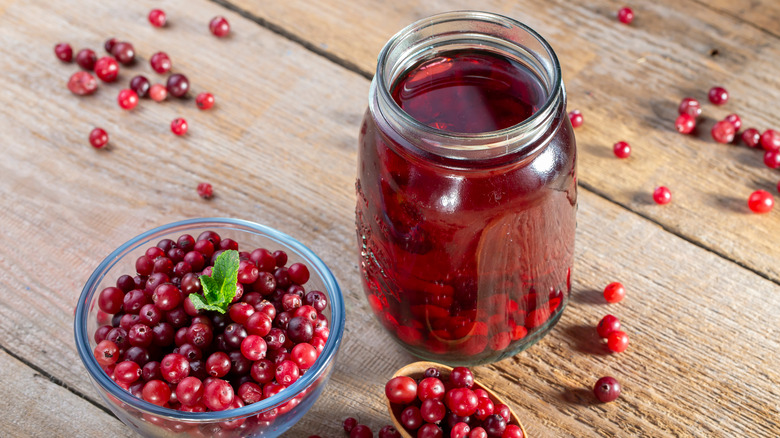Is Cranberry Juice Good For Your Kidneys?
According to the Advanced Urology Institute, our kidneys are amazing organs. They filter toxins, waste, and excess water from approximately 200 quarts of blood daily to keep our bodies feeling their best. Considering how much work the kidneys put in for us every day, it's no wonder they may benefit from a boost now and then to ensure optimal function. There are dozens of home remedies out there, and you may have heard that cranberry juice can help with kidney-related issues. But is cranberry juice really good for your kidneys? That depends.
The Cleveland Clinic says cranberries are packed with numerous minerals and nutrients, including antioxidant polyphenols, manganese, vitamin C, vitamin E, vitamin K, and lots of fiber. But cranberry juice cocktails usually come loaded with unhealthy added sugar. They also often include other juices like apple, pear, or raspberry to make them taste sweeter. Mixing in other juices means you're not actually getting as much cranberry juice as you may think and, therefore, not getting as many of the benefits. Other factors impact how much cranberry juice can benefit the kidneys, too.
The best cranberry juice for kidneys
Many studies, including this 2019 trial in Food & Function journal, suggest cranberry supplementation may help protect kidney health by preventing urinary tract infections (UTIs), providing antioxidant and anti-inflammatory effects, and helping balance the gut microbiome. Healthline outlines the kidney-friendly nutrients contained in cranberries, including powerful A-type proanthocyanidins. But the benefits from many of these active compounds, including A-type proanthocyanidins, may be removed or reduced during processing.
So, while the A-type proanthocyanidins in cranberries have been shown to improve kidney function and even protect against renal failure, as in this PLoS One 2013 study, drinking a highly-processed cranberry juice cocktail made from concentrate may not confer all of the desired benefits. Lifeline Screening advises drinking 100% water-based cranberry juice (not from concentrate) with no sugar added to help you receive more of the cranberries' protective benefits. Alternatively, taking cranberry extract by mouth may provide better protection against urinary tract infections in the kidneys, according to WebMD.
Despite the multiple health benefits cranberries confer and their strong protective properties, cranberry juice has not been shown to treat or cure any illness or disease associated with the kidneys, including UTIs. Mount Sinai warns against taking large doses of cranberry products if you take the blood thinner Warfarin or use aspirin regularly, as combining cranberry supplements with these products may cause complications. As always, you should ask your doctor before taking any new supplement.


